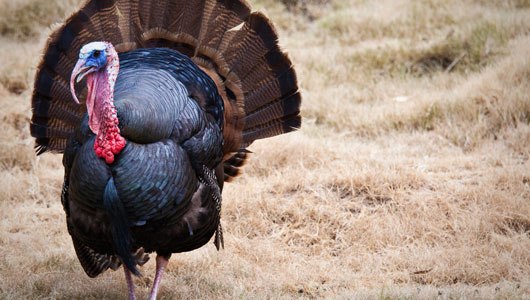Thanksgiving is upon us. In an ideal world, we’d be headed out into the steppes this weekend to hunt a wild turkey for the feast. Alas, the closest we’ll ever get to a wild turkey is a bottle of bourbon. So we need to know how to buy a turkey that’s sustainably raised. Luckily, NRDC Smarter Living has the answers — and they’re as easy as 1-2-3.
1. Always know where your bird came from.
If the person selling you the turkey is not the farmer, s/he should at least be able to tell you where it came from and how it was raised. To know what to ask and what answers you should be listening for, whether talking with a farmer, butcher or store manager, download Sustainable Table’s terrific question and answer sheets. To learn what different claims really mean and whether you can trust them, check out Labels to Look For When Picking Poultry.
2. Choose a heritage, organic or sustainable turkey.
What’s a heritage turkey?
There is a movement to bring back older varieties of turkeys, many of which originated in the United States. Groups like Slow Food USA and the American Livestock Breeds Conservancy are working to reintroduce genetically diversified varieties of animals, including turkeys, that were common decades ago. These animals, often referred to as heritage breeds, are naturally bred and contain no hormones or antibiotics. By promoting genetically diverse turkeys, these groups are working to ensure the survival of the species.
Heritage turkeys are more expensive because there is such a small number of them, and in many cases you must order in advance. Many farmers raise only enough turkeys to cover demand, so most consumers order their birds months in advance.
What about organic?
If you aren’t able to get a heritage turkey, another option is to buy an organic and/or sustainable bird. To be certified organic by the USDA, turkeys must be raised with no antibiotics, no growth enhancers and only organic feed, and they must be given access to the outdoors. The animals can be a heritage breed or the more common Broadbreasted White.
Beyond organic, are there other labels to consider?
Organic farming generally falls within the accepted definition of sustainable agriculture. However, it is important to distinguish between the two, since organic products can be unsustainably produced on large industrial farms, and farms that are not certified organic can produce food using methods that will sustain the farm’s productivity for generations.
Farmers who raise sustainable turkeys are not overseen by any group or agency and have no legal guidelines to follow, though many actually exceed USDA organic standards. “Sustainable” refers more to a philosophy about agriculture than “organic,” which is bound by its legal definition. “Sustainable” has thus come to describe the practices of farmers who preserve the land, treat their animals and workers humanely and help support the local community. Sustainable turkeys can be a heritage breed or the Broadbreasted White.
Though there is no single set of standards for sustainable agriculture, there are several labels for which high standards have been set, and farms have been third-party-certified for having met them. These include:
Animal Welfare Approved: Sets high standards for health, shelter and handling, including a requirement that animals spend most of their life in pasture. Prohibits growth hormones; allows antibiotics only for sick animals.
Certified Humane: Sets high standards for health, shelter and handling; prohibits growth hormones; allows antibiotics only for sick animals.
Food Alliance Certified: Requires low- or no-pesticide policy; advocates worker welfare, habitat protection, well-managed agriculture and humane care of livestock.
American Grassfed: Requires that animals eat grass only, and if they receive antibiotics due to illness they must be removed from the program. Growth hormones are prohibited.
3. Buy a local bird.
Thanksgiving is a celebration of the local harvest, so whether you are buying a heritage, organic or sustainable turkey, make sure it’s from a local farm. Great directories to local food sources include Local Harvest and the Eat Well Guides.
(via NRDC Smarter Living)
Photo: Brandon Siedel / Shutterstock (via MNN) wind farm near Ellensburg, Wash. (Matthew Ryan Williams / NYT)
